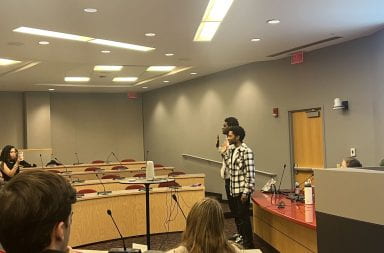Most agree that discrimination should not be tolerated. But are there situations when discrimination is allowable, or even necessary? The Council on Student Affairs at Ohio State faces that very question.
The issue came to the forefront in June when the Supreme Court ruled that a California college was allowed to force its student groups to follow an all-comers acceptance policy. Those groups would not be allowed to restrict membership based on sexual orientation or religion.
Religious groups at OSU aren’t required to follow that rule.
An accept-all-comers policy likely would not affect most groups; many look to enlist as many members as possible. But some student organizations have legitimate reasons for limiting membership. These particular groups could be seriously damaged if the floodgates of acceptance were forced open.
Before condemning the idea strictly on the grounds of encouraging discrimination, one must look at the motivations of the organizations. The goal of any group is to collect like-minded people who are committed to promoting a common agenda.
Though having large numbers is often important, a group might be inclined to deny membership to a person it thinks will harm the group. This could include someone who does not subscribe to the same religious or political ideology.
Individuals have similar motivations. The reason people join groups is to find others with similar interests, to enhance knowledge and to have fun. So why would someone want to join a group that endorses opinions he or she does not agree with?
One logical reason would be to harm or complicate the group. That particular individual would not be interested in helping the group fulfill its primary goal of spreading its message.
For example, if I were to join the Campus Pepsi Drinkers, I certainly would not be interested in helping that group spread such a flat, dissatisfying taste to other students across campus. A Republican joining a group of Democrats would rattle its platform of insanity. A Democrat who joins a group of Republicans might stifle its commitment to weakness.
I do not think this problem is widespread. With the university being as large as it is, if someone was denied access to one organization, he or she would still be welcome at countless others. But letting groups control their own enrollment protects their autonomy and provides them freedom to act on their own accord. A university with the power of determining who should be accepted essentially has the power to tell a group of people that their religious beliefs are wrong.
Don’t think upholding a non-discrimination policy would lead to uncontrollable prejudice. I don’t know anybody who likes being called a racist, sexist, bigot or homophobe. It’s in a group’s best interest to err on caution’s side — I can think of one writer who would enjoy exposing an organization that treats people unfairly.
But until then, we do not need the university holding our hands, telling us what to believe or whom to accept. Enforcing a non-discrimination policy would highlight a problem that really does not exist and could potentially worsen the experience for all involved.


